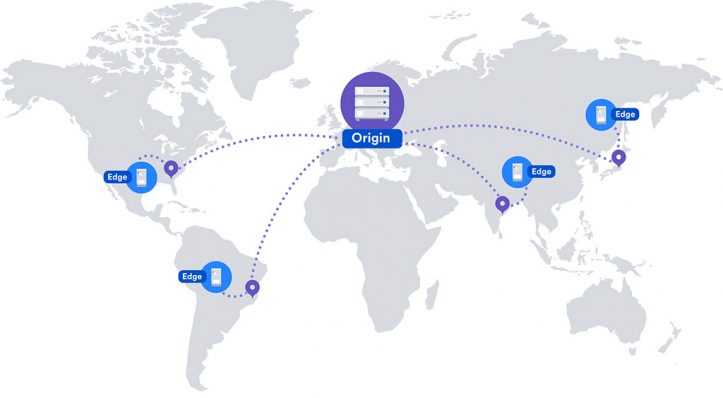What is a CDN? A Content Delivery Network is a geographically distant network of data centers and servers that help in efficient content delivery to end-users with minimum delay. It does so by bringing the data close to the user’s geographical location through strategically located data centers called Points of Presence (POIs). The closer a point is to a user’s location, the faster and higher the speed of data transfer.
Traffic can be decently distributed over different servers using content delivery networks (CDNs). Each customer or end-user requests traffic from a different number of relevant servers. This request is routed to a point of presence or a point of service (POE). At every destination, data is delivered to the end user or to the application software. The data transmitted via these protocols is highly efficient, reliable and cost-effective.

Each user or end user has his or her own IP address which is assigned by an Internet Service Provider (ISP). In a typical CDN system, the IP of each server is saved in a zone file. This is done so that when traffic arrives at a particular IP address, it is forwarded to the appropriate point of service or PoS. In addition, the destination server can determine the appropriate routing for a given packet of data by checking the header and other details of the incoming traffic. If everything looks OK, the packet is then delivered to the user’s IP address.
To make use of a CDN, you need to use a forwarding gateways or servers. These services make use of technologies such as GRETS, LSNs, ISCSI and BIND. These technologies are designed specifically for use with CDN and allow for multiplexing of the data so that different parts of the world can have fast access to the same content. You can think of it as a huge X-Box machine. This machine enables different parts of the world to have fast access to the content without delays.
However, although this technology has many benefits, there are also some drawbacks that should be considered before adopting CDN technology for improving website performance. For example, CDN introduces significant latency between the clients and the servers. Latency may cause website visitors to encounter delays in loading images, content, Flash files and other resources. In some cases, users may even be unable to load pages completely.
Another common use case for CDN is for businesses to deliver their own customised website content. Businesses usually have their own in-house developed web content but often times these will not be ready to be published on the World Wide Web. Using CDN allows the business to publish their own customised website content to customers without being held back by the higher bandwidth charges that would apply if they were publishing their own website content. The CDN provider will handle all bandwidth costs involved, which is why it is important that you ask your potential CDN provider about the costs involved in introducing and maintaining CDN connectivity between your business premise and the rest of the globe. Ask your potential CDN provider how much bandwidth and latency you would need to experience before investing in a CDN system.
Although these disadvantages do not outweigh the benefits of using CDN services for improving website performance, you should still consider a few things yourself before you get excited. If you are a small business and cannot afford to pay an extremely high monthly fee for CDN services then you will probably have to cut down on other services that you offer in order to afford CDN services for your business. This means that some of your services that you offer may have to decline or cut down on the number of videos that you stream per day or week. In some cases your customers may not be able to view your videos because the bandwidth that you are using is not sufficient to buffer the entire video file at once.
It is important that you are aware of the limitations of CDN when you are planning to switch to a CDN system for your business. Although the benefits of having a CDN are many and beneficial to your customers, you still need to know the limitations of a CDN system before you get started. Make sure that the CDN system that you are considering will actually work for you before you purchase the CDN equipment and begin using your new web page. Check with the various providers of CDN in order to determine the kind of system that they will provide to your business and the bandwidth limitations that you will be faced with for using your web pages.